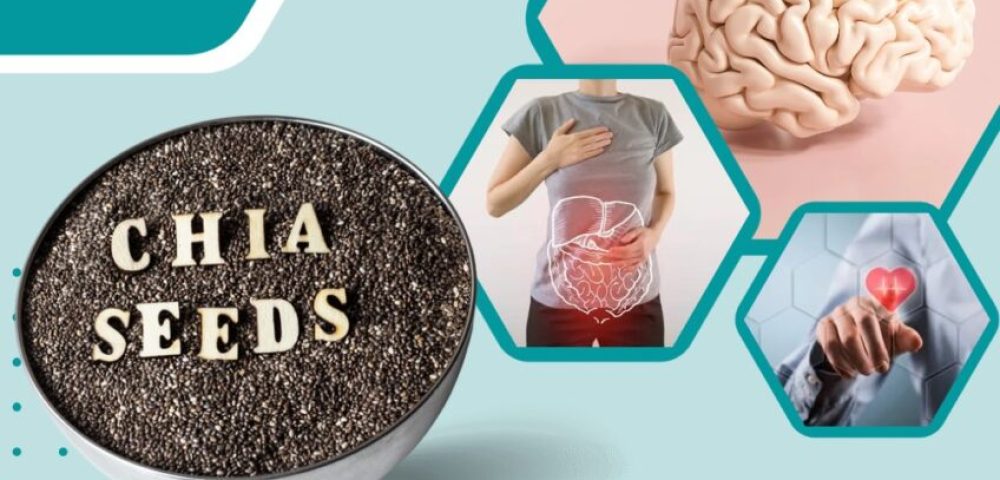Chia seeds, tiny yet mighty, have been making waves in the world of health and nutrition. A single tablespoon of these magical seeds can significantly impact your brain, stomach, and heart health.
Packed with nutrients, chia seeds contain 138 calories, 8 grams of fat, 12 grams of carbohydrates, 10 grams of fiber, and 5 grams of protein in a 28-gram serving. They also provide 18% of daily calcium needs, 27% of phosphorus, 30% of manganese, and smaller quantities of potassium, zinc, and copper.
Here is the nutritional profile for 3.5 ounces (100 grams) of chia seeds:
| Nutrient | Amount |
|---|---|
| Calories | 486 |
| Water | 6% |
| Protein | 16.5 grams |
| Carbs | 42.1 grams |
| Sugar | 0 grams |
| Fiber | 34.4 grams |
| Fat | 30.7 grams |
| Saturated | 3.33 grams |
| Monounsaturated | 2.31 grams |
| Polyunsaturated | 23.67 grams |
| Omega-3 | 17.83 grams |
| Omega-6 | 5.84 grams |
| Trans | 0.14 grams |
| Gluten | Free |
Page Contents
- 1 How does a tablespoon of chia seeds daily affect the stomach, brain, and heart?
- 2 Potential side effects of consuming chia seeds
- 3 FAQ
- 3.1 What happens to your stomach when you eat chia seeds every day?
- 3.2 Do they help with anxiety?
- 3.3 How much is too much chia seeds per day?
- 3.4 Do they affect hormones?
- 3.5 Can chia seeds clean arteries?
- 3.6 Does chia increase serotonin?
- 3.7 Do these seeds help with brain fog?
- 3.8 How many times a week should you eat chia?
- 3.9 Should you drink water after chia seeds?
- 3.10 How long should I soak them?
How does a tablespoon of chia seeds daily affect the stomach, brain, and heart?
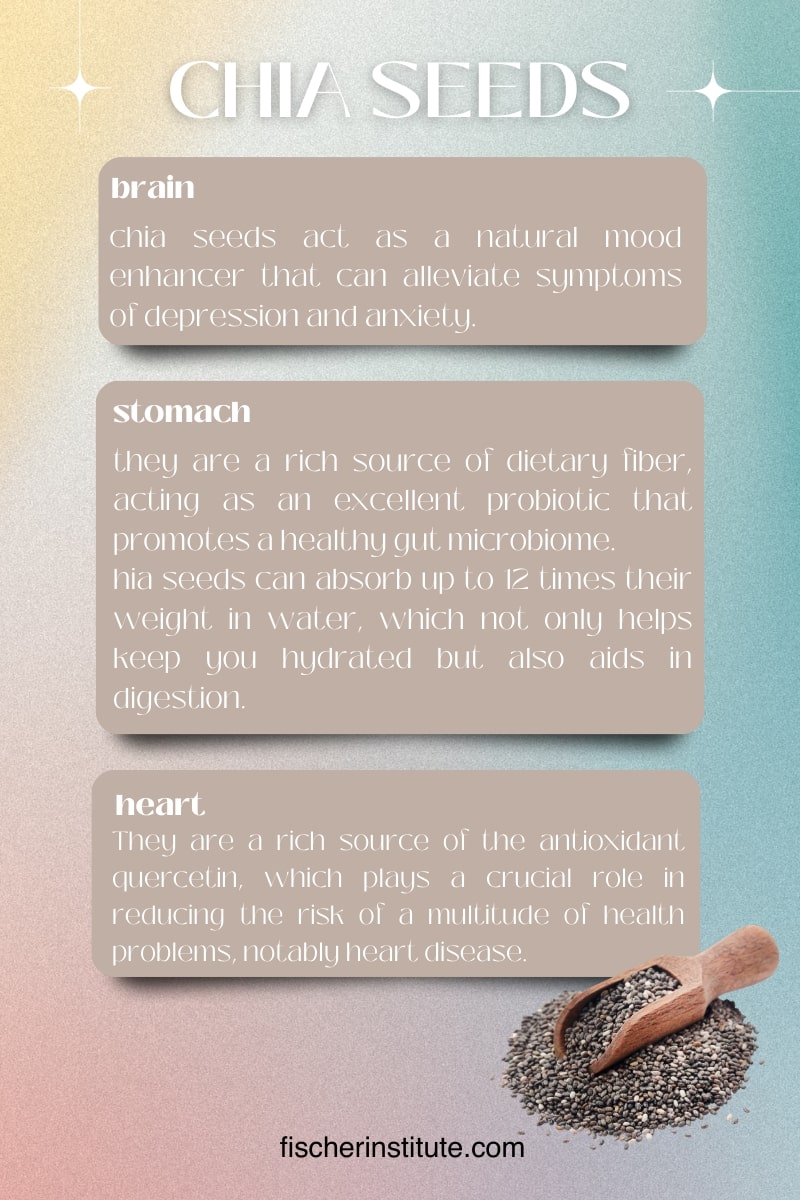
The brain booster
Chia seeds are a powerhouse of Omega-3 fatty acids, which are crucial for brain health. These fatty acids, also found in fish oil, flax seeds, and kiwi seeds, play a significant role in improving mood, regulating appetite, and maintaining the health of the skin and cardiovascular system.
They act as a natural mood enhancer that can alleviate symptoms of depression and anxiety. They also aid in regulating appetite, helping to prevent overeating and promoting healthier eating habits. Omega-3 fatty acids contribute to the health of the skin, giving it a natural glow, and the cardiovascular system, promoting heart health and reducing the risk of heart disease.
Consuming a tablespoon of chia seeds daily can provide a significant portion of your daily Omega-3 requirements, making them an easy and effective way to boost your brain health.
In a study published in the Journal of Food and Nutritional Disorders, researchers explored the potential of chia seeds, specifically Salvia Hispanica L., as a “brain superfood.” The study delved into the mechanisms by which these tiny seeds could enhance cognitive functions and potentially increase intelligence.
Additionally, these seeds contain a variety of other nutrients beneficial for brain health, including magnesium, which aids in nerve transmission, and iron, which is essential for the production of neurotransmitters, the brain’s chemical messengers.
The digestive aid
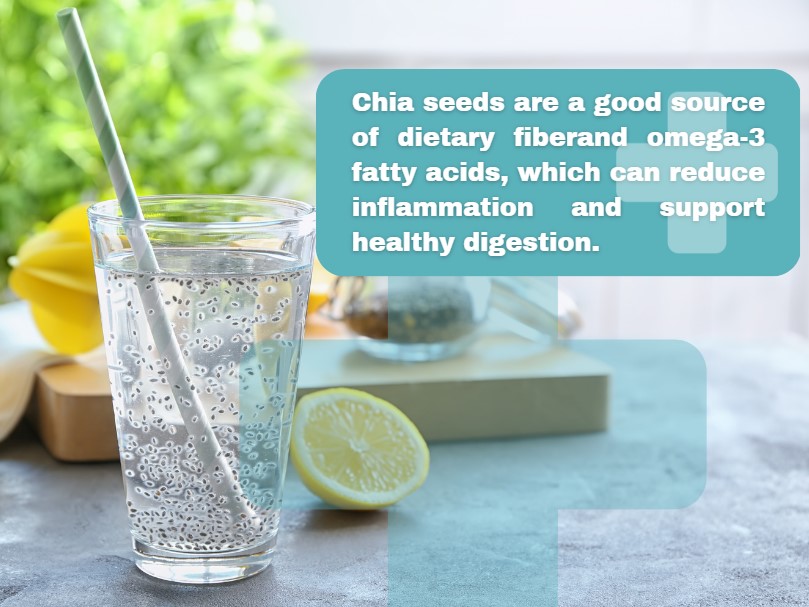
When it comes to promoting a healthy digestive system, chia seeds are a game-changer, especially for young children who can benefit from their nutritional profile. They are a rich source of dietary fiber, acting as an excellent probiotic that promotes a healthy gut microbiome.
As they are digested, chia seeds take on a unique gel-like texture due to their high soluble fiber content. This transformation is not just fascinating to observe, but it also has significant health benefits.
The gel-like substance helps to cleanse the intestines, removing waste and toxins in a gentle, natural manner. This can help prevent digestive issues such as constipation and promote overall digestive health.
Chia seeds could potentially enhance digestive health and alleviate symptoms of irritable bowel syndrome (IBS), including constipation.
How are they beneficial for IBS symptoms?
These seeds, with their rich nutritional profile, could potentially offer a natural way to manage IBS symptoms. They may even be more easily tolerated than some conventional IBS treatments.
The Omega-3 fatty acids, along with caffeic acid present in chia seeds, could potentially reduce inflammation in the gut. This, in turn, could help alleviate common IBS symptoms such as abdominal discomfort, bloating, and diarrhea.
Moreover, they are low in FODMAPs, making them a suitable choice for individuals with IBS.
Promoting gut health
A balanced gut microbiome, with a healthy ratio of “good” to “bad” bacteria, is crucial for overall health. Dysbiosis, or an imbalance in this bacterial ecosystem, can trigger inflammation and other health issues.
Chia seeds, with their high fiber and Omega-3 content, can support gut health by increasing the population of beneficial bacteria, reducing harmful bacteria, and strengthening the gut lining. This helps prevent the entry of harmful bacteria into the body.
Preventing constipation
Being a rich source of dietary fiber, chia seeds can help regulate bowel movements and prevent constipation in individuals with IBS-C.
As per the United States Department of Agriculture (USDA) National Nutrient Database, a serving of chia seeds (28 grams or 2 1/2 tablespoons) contains 11.2 grams of fiber.
Given their high fiber content, chia seeds can potentially expedite intestinal transit, thereby helping individuals manage constipation.
Heart health and beyond

Chia seeds are rich in antioxidants and fiber, boasting high levels of magnesium, zinc, iron, and calcium. This remarkable plant can significantly improve health, particularly in preventing heart disease.
They are a rich source of the antioxidant quercetin, which plays a crucial role in reducing the risk of a multitude of health problems, notably heart disease. Moreover, the high fiber content found in these seeds is instrumental in managing elevated blood pressure levels, which in turn, contributes to a lower risk of heart disease.
Chia seeds are:
- a superfood rich in fiber, which promotes digestion and healing of the digestive tract,
- superfood for the brain and heart. Chia contains 8 times more Omega 3 fats than salmon!
- rich in antioxidants,
- contains 5 times more calcium than milk,
- contains 7 times more vitamin C than oranges,
- 3 times more iron than spinach,
- 2 times more potassium than a banana,
- healthy food for skin, hair, and nails,
- a food that has a positive effect on balancing blood glucose levels.
Potential side effects of consuming chia seeds
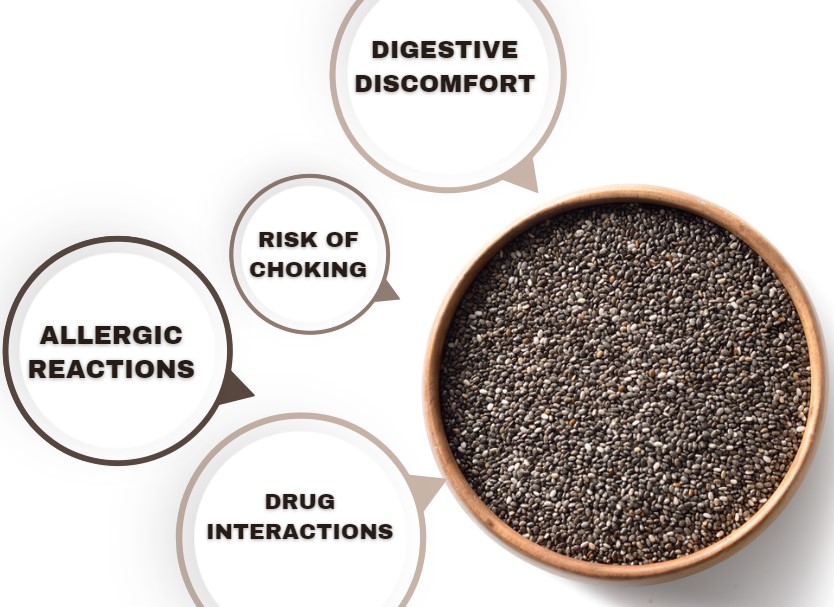
While chia seeds are generally recognized as safe and healthy food, they may cause certain side effects in some individuals. It’s important to understand these potential side effects to ensure you’re consuming this food in a way that’s beneficial to your health.
Digestive discomfort
One of the most common side effects associated with chia seeds is digestive discomfort. Chia seeds are high in fiber, with a single ounce providing an impressive 11 grams.
While fiber is beneficial for digestive health, promoting regular bowel movements and aiding in the control of blood sugar levels, an abrupt increase in fiber intake can lead to issues such as bloating, gas, and stomach cramps.
This is particularly true for individuals who are not accustomed to a high-fiber diet. To minimize this risk, it’s recommended to increase your fiber intake gradually, allowing your digestive system time to adjust.
Risk of choking

These seeds have the unique ability to absorb up to 12 times their weight in water, forming a gel-like substance. While this property is beneficial for creating a feeling of fullness and slowing the absorption of sugar into the bloodstream, it also poses a potential choking hazard.
If chia seeds are consumed dry and then come into contact with liquids in the throat or esophagus, they can expand and potentially cause blockage. Therefore, it’s generally recommended to either pre-soak chia seeds or consume them in a prepared dish, rather than eating them dry.
Allergic reactions
Although rare, some individuals may experience an allergic reaction to chia seeds. Symptoms can include skin rashes, hives, and watery eyes. More severe reactions can involve difficulty breathing and swallowing.
If you experience any of these symptoms after consuming chia seeds, it’s important to seek medical attention immediately.
Drug interactions
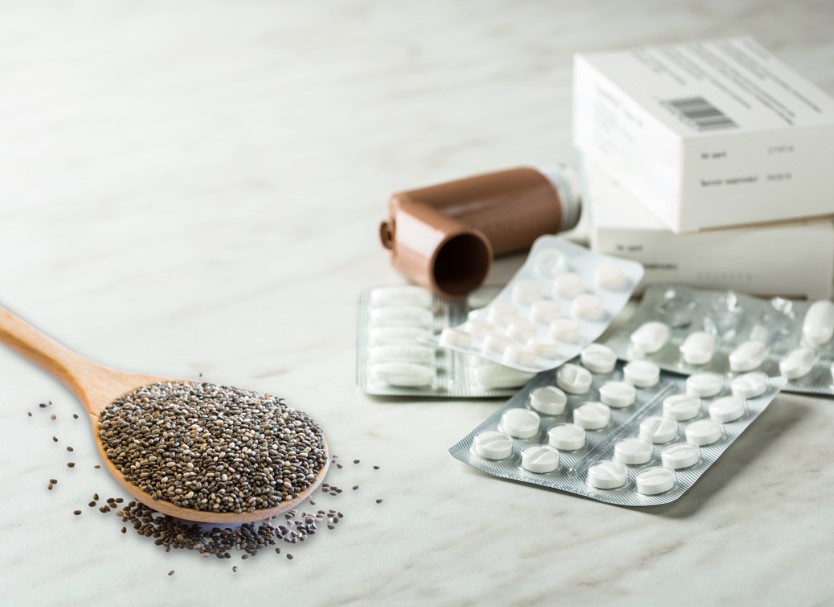
Chia seeds can potentially interact with certain medications due to their high fiber content. For instance, they may affect the absorption of oral medications if consumed at the same time.
This is because the gel-like substance that forms when chia seeds are soaked can create a physical barrier in the stomach and intestines, potentially slowing down the rate at which medication is absorbed into the bloodstream.
If you’re taking any medication, it’s advisable to consult with a healthcare professional before incorporating chia seeds into your diet.
FAQ
What happens to your stomach when you eat chia seeds every day?
These seeds are high in fiber, which aids in digestion by promoting regular bowel movements and preventing constipation. They also form a gel-like substance when soaked, which can help to cleanse the intestines. However, consuming too many chia seeds without adequate hydration can cause digestive discomfort, such as bloating and gas.
Do they help with anxiety?
Chia seeds are rich in Omega-3 fatty acids, which have been linked to improved mood and reduced symptoms of anxiety. However, they should not be used as a replacement for professional medical treatment for anxiety disorders.
How much is too much chia seeds per day?
While there is no set limit, it’s generally recommended not to consume more than 1.5 tablespoons of dry chia seeds at a time. Consuming too many chia seeds without enough liquid can lead to gastrointestinal issues due to their high fiber content and ability to absorb water.
Do they affect hormones?
There is currently no scientific evidence to suggest that chia seeds directly affect hormone levels. However, their high content of essential fatty acids can contribute to overall hormonal balance by supporting cell function and reducing inflammation.
Can chia seeds clean arteries?
Chia seeds are high in fiber and Omega-3 fatty acids, both of which have been linked to heart health. While they can’t “clean” arteries, a diet high in these nutrients can help reduce cholesterol levels and inflammation, promoting healthier arteries.
Does chia increase serotonin?
This food contains tryptophan, an amino acid that the body converts into serotonin, a neurotransmitter that helps regulate mood. However, more research is needed to fully understand the impact of chia seeds on serotonin levels.
Do these seeds help with brain fog?
Chia seeds are rich in Omega-3 fatty acids, which support brain health and cognitive function. While there’s no direct evidence that chia seeds can alleviate brain fog, a diet high in Omega-3s may help improve mental clarity.
How many times a week should you eat chia?
Chia seeds can be safely consumed every day, as long as you stay within the recommended serving size of 1.5 tablespoons of dry seeds. They are versatile food that can be easily incorporated into a variety of meals.
Should you drink water after chia seeds?
Yes, it’s important to drink plenty of water when consuming chia seeds due to their high fiber content and ability to absorb water. This helps prevent digestive discomfort and aids in the formation of the gel-like substance that promotes gut health.
How long should I soak them?
Chia seeds should be soaked for at least 20 minutes, but they can be soaked for longer, even overnight. Soaking allows them to absorb water and form a gel-like substance, making them easier to digest and allowing for the release of their nutrients.
In conclusion, chia seeds are a versatile and nutrient-dense food that can be easily incorporated into your diet. Their health benefits are extensive, making them a worthy addition to your daily routine. So, why not give these tiny powerhouses a try? Your brain, stomach, and heart will thank you!
Astrona Knight is the Editor-in-Chief at Fischer Institute, where she shares her extensive knowledge on health and wellness topics. Her insightful articles cover everything from diet and nutrition to mental health, providing readers with practical tips and the latest research findings.
Also Read:
- Chia Seeds for Babies and Children: A Superfood or…
- Can Chia Seeds Go Bad? -Shelf Life and Storage Tips
- Cashew Consumption: A Boost for Brain Health and Memory
- Should You Take Pre-Workout on an Empty Stomach - Is…
- How To Stop Stomach Cramps From Laxatives - No More…
- The Incredible Chia Seed Benefits That Everyone Is…

